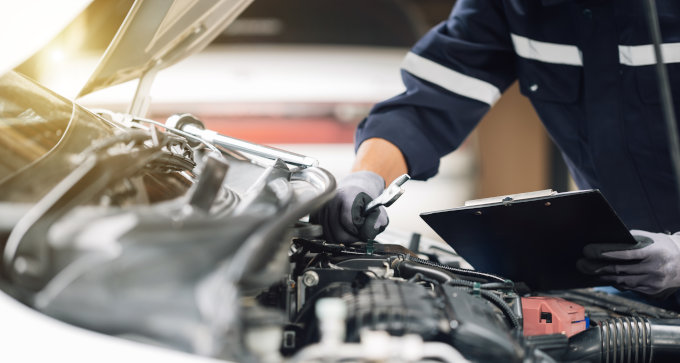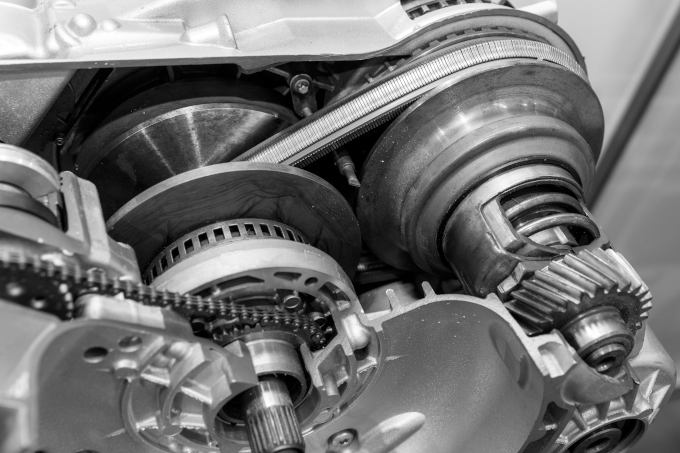Our transmission is a critical component in your vehicle. Responsible for transmitting power from the engine to the wheels, a malfunctioning transmission can cause significant problems, leaving you stranded and facing high repair bills. Unfortunately, many drivers unwittingly engage in behaviors that can lead to premature transmission failure. Several common mistakes can ruin your vehicle's transmission, from neglecting routine maintenance to poor driving behaviors. We’ll explore five of the most common mistakes and provide tips to help you avoid them, ensuring your transmission stays in good working order for many years to come.
Mistake #1: Neglecting Regular Transmission Maintenance
Transmission maintenance is essential because the transmission is a critical component of your vehicle's drivetrain and is responsible for transferring power from the engine to the wheels. Neglecting transmission maintenance can lead to a variety of problems, including reduced performance, decreased fuel efficiency, and even complete transmission failure.
Regular transmission maintenance, such as fluid and filter changes, can help ensure your transmission stays clean and free from contaminants that can prematurely age its components. Over time, transmission fluid can break down and become contaminated with dirt, metal shavings, and other debris. This can cause the fluid to lose its ability to lubricate and cool the transmission, leading to increased friction, heat buildup, and overheating.
In addition to regular fluid and filter changes, other transmission maintenance tasks include inspecting and adjusting the transmission bands and clutches, checking the transmission linkage, and performing a diagnostic scan to detect any issues before they become significant problems.
By keeping up with regular transmission maintenance, you can help extend your transmission's life and prevent costly repairs or even the need for a complete transmission replacement.
Mistake #2: Ignoring Warning Signs of Transmission Problems
Ignoring or not recognizing the signs of transmission failure can be very dangerous for your vehicle, as it can lead to complete transmission failure. Here are some signs of serious trouble that you should never ignore:
Warning Dashboard Lights
Not all vehicles have a dedicated warning light for transmission issues, but many modern vehicles do. If your car or truck does have a transmission warning light, it will typically be a gear-shaped icon, and it may be yellow or red, depending on the severity of the problem.
Even if your vehicle does not have a transmission warning light, other warning lights may come on when there is an issue with the transmission. For example, the check engine light (CEL) may come on if there is a problem with your vehicle's transmission and other systems. Additionally, some vehicles have a warning light for the transmission fluid level or temperature, indicating a transmission problem.
Strange Noises
Any unusual noise coming from your transmission can indicate a wide variety of issues. These noises and sensations can differ from one type of transmission to another.
Whining, humming, or buzzing sounds are common in a vehicle with an automatic transmission that is having trouble, especially when the vehicle is in gear. The vehicle may also shake or jerk when shifting gears or during acceleration, and there may be a delay in gear engagement or slippage, where the engine revs, but the vehicle does not move forward or accelerate as it should.
In a vehicle with a manual transmission, grinding or scraping sounds may be produced when shifting gears, especially when shifting into first or reverse gear. The clutch may also slip, causing the engine to rev without the vehicle moving forward, and there may be difficulty shifting gears or a feeling of resistance in the gear shift lever.
If you have a CVT transmission, you may hear a whining or humming sound that increases in pitch with acceleration. This sound may be more noticeable than in other types of transmissions because there are no distinct gear changes.
In addition to the whining or humming sound, a failing CVT may also produce a jerking or shuddering sensation during acceleration, a delay or hesitation when shifting, or a burning smell due to overheating. These symptoms can indicate issues with the CVT's belts, pulleys, or other components.
It's important to note that the specific sounds and symptoms of a failing transmission can vary depending on the type and severity of the problem, as well as the make and model of the vehicle and its transmission type. If you suspect your transmission is failing, it's best to have it inspected and diagnosed by a qualified transmission expert as soon as possible.
Slipping Gears (Manual and Automatic Transmissions)
Slipping gears is a common transmission problem that occurs when the transmission cannot properly engage a gear or maintain its position in the selected gear. This can happen for various reasons, including low transmission fluid levels, worn clutch bands or gears, and damaged seals.
Not paying attention to slipping gears can hurt your transmission in several ways:
- Increased wear and tear: Slipping gears can cause excessive wear and tear on the transmission components, resulting in premature failure of the transmission and the need for costly repairs.
- Reduced performance: Slipping gears can also reduce your vehicle's performance. You may notice that your vehicle is sluggish or unresponsive when you try to accelerate, and it may take longer to shift into the correct gear.
- Serious safety risks: Slipping gears can also be a safety risk, as it can cause unexpected changes in vehicle speed or acceleration. This can be particularly dangerous if driving on a busy highway or in heavy traffic.
If you notice that your transmission has slipping gears, it's important to have it checked by a qualified transmission expert immediately. Ignoring this issue can lead to more serious problems down the road, including complete transmission failure. Regular maintenance, which includes checking and replacing the transmission fluid as needed, can help prevent slipping gears and other transmission issues from occurring in the first place.
Mistake #3: Exceeding Your Vehicle’s Towing Capacity
The towing capacity varies depending on the make and model of your vehicle, as well as other factors such as the engine size, transmission type, and axle ratio.
To determine the towing capacity of your vehicle, consult your owner's manual or contact the manufacturer directly. The owner's manual should have a section that provides the maximum weight your vehicle can tow and any additional guidelines or recommendations for towing.
Exceeding the towing capacity of your vehicle can put additional strain on your transmission, which can cause damage over time. In addition to consulting your owner's manual, you should also consider other factors, such as the weight of the trailer, the weight of any cargo you're carrying, and the terrain and driving conditions you'll encounter while towing.
It's always better to err on the side of caution and stay well within your vehicle's towing capacity to avoid transmission problems and overheating while towing.
Note: Your vehicle's weight capacity and towing capacity are separate measurements. Your vehicle's weight capacity refers to the maximum weight it can carry, including passengers and cargo, and is commonly known as the gross vehicle weight rating (GVWR). This limit is listed on a label on the driver's side doorjamb.
Mistake #4: Not Maintaining Your Transmission Fluid
Vehicle transmission fluid is a specialized fluid used in the transmission system of a vehicle. It serves multiple functions, including lubricating the transmission components, transferring power from the engine to the transmission, and helping to regulate the transmission's temperature.
It is typically made up of a mixture of oils and additives that provide the necessary lubrication and performance properties for the transmission. The exact composition of the fluid can vary depending on the type of transmission and the manufacturer's specifications, so you must use the correct type of transmission fluid for your vehicle’s make and model.
Transmission fluid is essential to the proper functioning of a vehicle's transmission system. It helps to cool and lubricate the transmission components, reducing friction and wear. It also helps keep the transmission in the correct gear and helps prevent slipping.
Not maintaining your transmission fluid can seriously impact the health and longevity of your transmission in several ways, including:
- Overheating: Transmission fluid is an essential component that plays a critical role in keeping the transmission system of a vehicle operating smoothly. Its primary functions are to cool the transmission and prevent it from overheating. However, if the fluid level is low or the fluid itself is dirty, it won't be able to perform its job effectively, which can cause overheating and result in significant damage to your transmission’s components. In fact, overheating is the primary cause of transmission failure, and the root cause is often directly linked to the quality and quantity of the transmission fluid.
- Increased friction and wear: Transmission fluid lubricates the transmission components, reducing friction and wear. When the fluid level is low or dirty, it can't lubricate the components effectively, causing increased friction and wear on the transmission parts. This can lead to premature failure of the transmission.
- Slipping gears: Transmission fluid also helps to maintain the pressure and friction needed to keep the transmission in the correct gear. If the fluid level is low or dirty, the transmission may slip gears, causing reduced performance and potential damage to the transmission components.
- Contamination: Dirty or contaminated transmission fluid can cause buildup and debris to accumulate in the transmission, leading to potential damage to the transmission components. Contamination can occur naturally over time and can be accelerated by overheating transmission fluid or not changing the transmission filter regularly.
- Expensive repairs: Neglecting transmission fluid maintenance can lead to serious damage to the transmission, resulting in expensive repairs or even replacement of the transmission.
Maintaining proper transmission fluid levels and quality is important for ensuring the smooth operation and longevity of your vehicle's transmission. Here are some tips for protecting the health of your transmission fluid:
- Use the correct type of transmission fluid: Different vehicles require different types of transmission fluids, and using the wrong type can damage your transmission. Refer to your owner's manual for the recommended type of transmission fluid.
- Change your transmission fluid periodically: Over time, transmission fluid can break down and become contaminated, leading to poor performance and potential damage to your transmission. Most manufacturers recommend changing your transmission fluid every 30,000-60,000 miles but check your owner’s manual for specific recommendations.
- Check for leaks: Transmission fluid leaks can cause your transmission to run dry, leading to severe damage from friction and overheating. If you notice any leaks, get them repaired immediately.
- Avoid towing heavy loads: As mentioned above, hauling heavy loads can cause your transmission to overheat and the transmission fluid to break down quickly. If you must tow, use the recommended equipment and avoid steep inclines.
By following these tips, you can help ensure that your transmission fluid stays in good condition, allowing your vehicle to run smoothly and reducing the risk of costly transmission repairs.
Mistake #5: Bad Driving
Poor driving behaviors can negatively impact your transmission’s health, causing excessive wear on the transmission's internal parts and potentially leading to early failure. Here are some common examples:
- Impatient or sloppy shifting: Shifting gears while the vehicle is still moving can put stress on your transmission, which can cause accelerated wear and potentially lead to costly repairs or replacements. This is because the transmission is designed to engage the gears when the vehicle is stationary, and attempting to shift while the vehicle is moving can cause damage to the gears and other components.
- Aggressive Acceleration: When you accelerate aggressively, the engine sends more power to the transmission, which has to work harder to transfer that power to the wheels. This can cause increased friction and heat buildup, leading to premature wear and tear on the gears, clutch, and other transmission components. Aggressive acceleration can also cause the transmission fluid to overheat, which can cause fluid breakdown and reduce its effectiveness in lubricating and cooling the transmission. This can lead to increased wear on the transmission components, reduced performance, and potential damage.
- Sudden Braking: When you suddenly slam on the brakes, your vehicle’s momentum transfers to the transmission and other drivetrain parts, causing them to work harder than usual. This sudden shock can cause stress on the gears and other components, leading to damage or failure. Sudden braking can also cause the transmission fluid to overheat, which can cause it to break down and become less effective at lubricating and cooling the transmission. Over time, this can damage the gears and other components, reducing the performance and lifespan of the transmission.
In conclusion, transmission failure is one of the most costly and frustrating issues a vehicle owner can face. However, it is often preventable if drivers take the necessary precautions and avoid the common mistakes that can lead to transmission failure. By driving responsibly, maintaining proper fluid levels and regular maintenance, and being vigilant for signs of trouble, you can help extend the life of your vehicle's transmission. It is also important to avoid exceeding your vehicle's towing capacity to avoid undue stress on your transmission. By following these simple steps, you can help ensure that your vehicle's transmission stays healthy and reliable for years to come.
Help Prevent Transmission Failure with AAMCO
At AAMCO Knoxville, we understand the frustration and expense that comes with transmission failure. That's why we're committed to helping you avoid it in the first place. Our expert technicians can help you maintain your transmission by providing regular maintenance, such as fluid changes and inspections. With our advanced diagnostic tools and extensive experience, we can catch potential issues early and prevent major repairs down the line. Don't let transmission failure catch you off guard. Trust the experts at AAMCO Knoxville to help keep your vehicle running smoothly. Contact us today to schedule your appointment, and let us help you avoid transmission failure!











